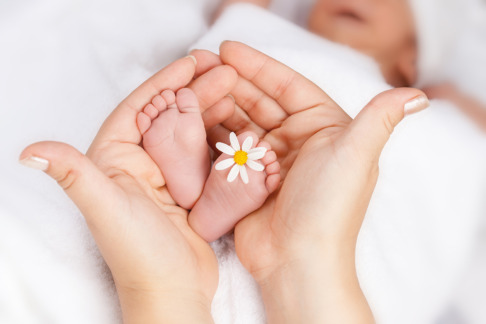Information about infertility
Involuntary infertility is an increasingly common problem among couples. Every year in Finland, approximately 3,000 couples seek help for infertility.
What are the causes of infertility?
About 15% of couples suffer from involuntary infertility at some point in their lives. In most cases, fertility is impaired and permanent infertility is very rare. When assessing the need to initiate examinations and treatment, infertility generally refers to a situation in which, despite a regular sex life, pregnancy has not started within a year. About 80% of couples become pregnant within a year if the woman is under 35 years of age. Over the next year, about half of couples will start expecting a child without treatment. The longer the infertility has lasted, the less likely it is that pregnancy will begin without treatment.
Infertility or impaired fertility can be caused by many different factors. Therefore, it is important to carefully review the couple’s background information, such as general diseases, medication, lifestyle, eating and physical activity, weight, possible exposure agents, etc. These can reveal the underlying causes of infertility and outline the plan for further examinations. At Felicitas Mehiläinen, we investigate fertility issues thoroughly to ensure the best possible chance of pregnancy and to secure a good and safe pregnancy. If the treatment of the couple’s general diseases is in balance, their lifestyles moderate and body mass indices within normal limits, good results can be achieved with fertility treatments. Even if the cause of infertility is not identified with basic examinations, treatments provide help in almost all causes of infertility. Sometimes the actual cause can be found at the cellular level during treatments, such as in vitro fertilisation.
Fertility should be taken care of. It is important to educate young people on how to protect fertility over the course of their lives. You can protect yourself from sexually transmitted diseases and genital infections by using a condom. It is important to ensure the prevention of unwanted pregnancy, avoid smoking and start having children before the end of the fertile age, if you wish to have a child.
General diseases
Such general diseases as diabetes, chronic bowel diseases, epilepsy and coeliac disease, as well as other autoimmune diseases are taken into account. Appropriate treatment balance of these promotes fertility and reduces the risk of problems with pregnancy. With regard to medications, anti-inflammatory drugs can impair ovulation and interfere with embryo implantation. Therefore, anti-inflammatory drugs should be avoided during ovulation. With regard to antihypertensive medications, calcium channel blockers and long-acting sulfonamides reduce sperm quality. Anabolic steroids such as testosterone can lead to complete sperm loss and the condition does not always return to normal after stopping the medication. Chemotherapy and radiotherapy can permanently damage the ovaries and testicles.
Learn more: How lifestyles affect fertility?
Age affects fertility
The effect of the woman’s age on fertility is crucial. Postponing having children is one of the reasons for the general increase in infertility. The possibility of spontaneous pregnancy decreases sharply with age. For one menstrual cycle, the chance of a 20-year-old woman getting pregnant is about 35%, for a 30-year-old about 17% and for a 40-year-old about 6%. For a 45-year-old woman, it is only 0.5%. The possibility of successful infertility treatments declines at the same rate. The woman’s age is the single most important factor in the likelihood of successful pregnancy in all forms of treatment that use the woman’s own gametes.
Learn more: Age and fertility
Reasons for infertility
The cause of infertility (or impaired fertility) is equally common in women (25%), men (25%), both parties (25%) or the cause is unknown (25%). The most common causes of impaired fertility are:
- Ovulation disorders (20–30%)
- Causes related to the man (20–30%)
- Fallopian tube damage (10–20%)
- Endometriosis (10–20%)
- Uterus disorders (2-5%)
Ovulation disorders
In women, the most common cause of infertility is ovarian dysfunction, in which case the egg’s maturation and release, i.e. ovulation, do not function correctly. Irregular, long menstrual cycles (more than 37 days) may be a symptom of polycystic ovarian syndrome (PCOS). Excess production of milk hormone (prolactin) as well as thyroid disorders can also result in egg cell maturation failure. Infertility may be caused by an overactive or underactive thyroid gland. Mild thyroid dysfunctions that would be only monitored in other circumstances are treated when examining infertility. In most cases, good treatment of thyroid disorders alone is enough for the pregnancy to begin and no actual fertility treatments are even needed.
Ovarian function may also be disturbed due to being overweight or underweight. In these cases, controlling weight within normal limits is important. Normal weight and regular exercise promote reproductive health. Excessive physical activity can, however, make it difficult to get pregnant by preventing the growth of the ovarian follicle.
Premature ovarian insufficiency
In some cases, the cause of infertility may be premature ovarian insufficiency. Approximately one percent of women will have premature menopause, that is, their ovarian function will cease completely before the age of 40. In this case, treatments with the woman’s egg cells cannot be carried out. In rare cases, premature ovarian insufficiency is caused by chromosomal abnormalities such as Turner syndrome (45,X0) and Fragile X syndrome (mutation of a gene called FMR-1 on the X chromosome).
Fallopian tube damage
About 15% of women undergoing infertility examinations are diagnosed with fallopian tube damage. The fallopian tubes may be either completely obstructed or surrounded by adhesions that interfere with the passage of the egg in the fallopian tube. The obstruction of fallopian tubes is most commonly caused by a sequela of inflammation (e.g. chlamydia). Pelvic surgeries or endometriosis can also cause the fallopian tube to become obstructed due to adhesions. The damage may affect only one of the tubes, in which case the pregnancy can begin without treatment. Total obstruction prevents the onset of natural pregnancy. In such cases, the mode of treatment used is in vitro fertilisation. In some cases, the obstruction can be removed with surgical treatment, but it can increase the risk of ectopic pregnancy.
Endometriosis
Endometriosis is a condition in which the lining of the uterus appears as separate colonies outside the uterus. The colony becomes thick and bleeds like the mucous membrane inside the uterus. Menstrual pain and pain from intercourse or vibrations can be signs of endometriosis. Endometriosis is a common disease among women of reproductive age. It can be identified in a gynaecological examination as tender bumps. If endometriosis has damaged the ovaries, they may develop endometriomas, so-called “chocolate cysts” that are filled with old blood. Some endometriosis colonies can only be found in an abdominal endoscopy.
Uterine malformations
Uterine malformations and muscle tumours that grow towards the uterine cavity (myomas) can interfere with the onset and course of pregnancy. Repeated scrapings and inflammations of the uterine cavity can also cause adhesions and thus complicate the onset of pregnancy.
Causes of male infertility
Semen disorders may be congenital, acquired or transient. Therefore, abnormal findings must be controlled before further examinations. Male infertility can be caused by an undescended testicle, varicose veins in the testicle, antisperm antibodies or a genital infection, such as chlamydia, in the man’s medical history. In some rare cases, the underlying cause of the sperm disorder may be damage to the sperm’s DNA strand, i.e. DNA fragmentation, insufficiency of the areas that control the Y chromosome’s sperm formation, i.e. Y deletion, or other chromosomal abnormalities. These abnormalities include, for example, the Klinefelter syndrome, in which a man has an extra X chromosome (47, XXY).
Male fertility starts declining if there are fewer than 13 million sperm per millilitre of semen. In some men, the semen contains no sperm, but they can still be found in a testicle biopsy sample. In the case of severe sperm disorders or if no sperm are produced, the use of donated sperm may be considered.
Diseases and lifestyle factors can increase the amount of oxygen radicals in sperm, that is, cause so-called oxidative stress, which means an imbalance in the oxidation-reduction state of cells. Minor oxidative stress is required for normal sperm function, but excessive stress can cause damage to the sperm’s surface, motility and genetic material, i.e. DNA, and may impair fertility. Antioxidant formulations specially developed for this can remedy the situation, but ensuring good lifestyles is always the preferred option.
Improving lifestyles always has a positive effect. Even a small improvement in the quantity and quality of sperm can improve the chances of conception and the success of fertility treatment. Even if the reduced quantity or quality of sperm is an indication for micro-injection therapy (ICSI), it is a good idea to prepare for the treatment by adjusting your lifestyles.

